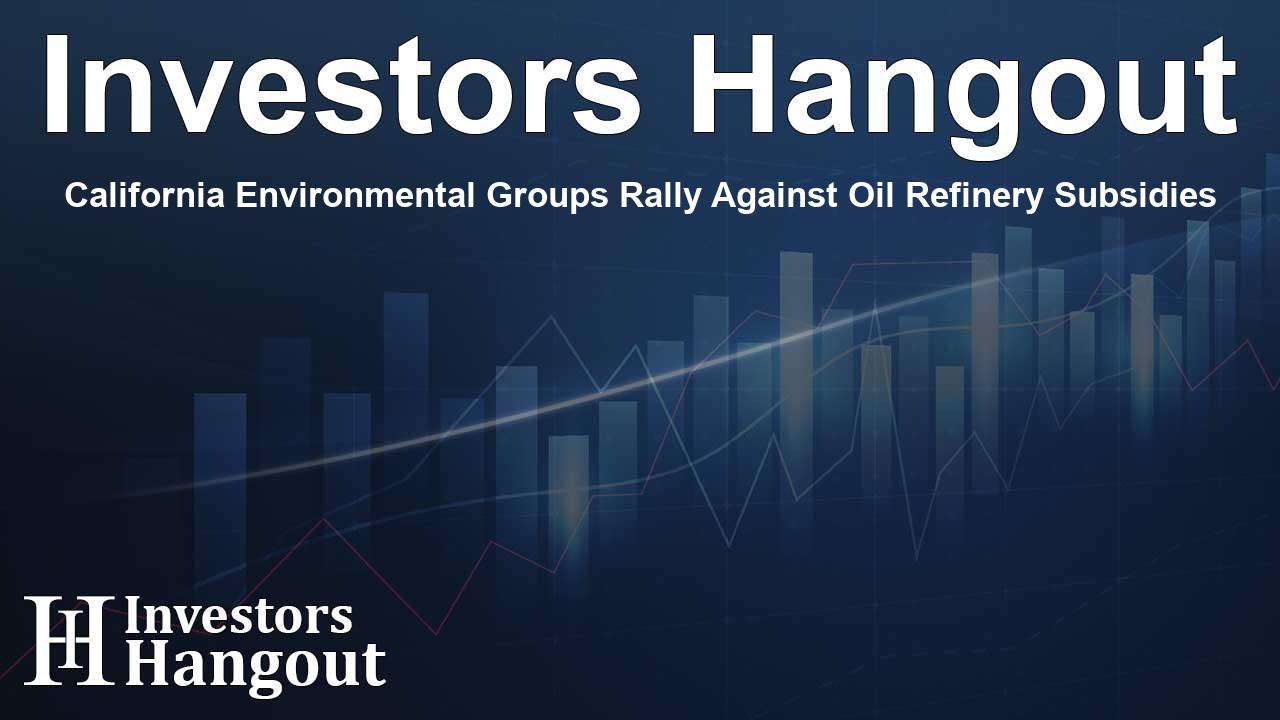California Environmental Groups Rally Against Oil Refinery Subsidies

Public Demand for Accountability from Oil Refiners
California’s energy landscape has reached a significant crossroads as numerous environmental and public interest groups challenge suggested bailouts for oil refiners. These groups, numbering over fifty, called upon state officials to maintain strict accountability and prioritize consumer protection. This collective effort reflects growing concern over proposed regulatory rollbacks from the California Energy Commission (CEC).
Concerns Over Proposed Regulatory Rollbacks
The CEC’s recent proposals include initiatives that could diminish the stringent regulations aimed at controlling oil refinery operations. Among the numerous rollbacks suggested is a halt to the price gouging penalty rule, originally enacted by the legislature in 2023, which served as a protective measure for consumers facing rising fuel prices. Additionally, the proposals include easing restrictions on oil well permitting in regions like Kern County, raising alarms among environmental advocates.
Excessive Profits Amidst Crisis
According to newly released data from the CEC, oil refiners in California have been reporting staggering profit margins that significantly exceed national averages. For instance, the data revealed a combined gross refining margin of $1.71 in April alone, indicating that refiners are profiting disproportionately from consumer purchases. This situation intensifies the scrutiny on the oil refining industry and the necessity for transparent regulatory practices.
Voices from the Community
In a recent letter addressed to state leaders, including Governor Newsom, Senate Pro Tem Mike McGuire, and Assembly Speaker Robert Rivas, these public interest groups emphasized that, despite current claims, refiners do not require financial bailouts. They pointed out that the recent statistics from the CEC indicated an impressive retail gross refining profit margin of $1.02 per gallon, coupled with additional costs such as a distribution margin of 69 cents per gallon. Such excessive profit retention raises ethical concerns regarding the fairness of consumer prices in California.
Impact on the Public and Environment
The groups express that the current operational model of oil refiners charges Californians rates more than double what consumers pay in other regions. They argue that offering more subsidies or financial assistance to an already profitable industry would be counterproductive and harmful to public interests.
Strategic Actions Suggested by Advocates
The organizations involved are actively urging state officials to adhere to previously initiated plans aimed at establishing rules for price gouging penalties, refining existing safety management regulations, and implementing minimum inventory requirements. The push for stricter regulations aims not only to protect consumers but also to safeguard refinery workers and surrounding communities from potential hazards and economic fallout associated with refinery incidents.
Key Groups Standing Against Oil Subsidies
A diverse coalition of environmental organizations lends their voices to this campaign, aiming to hold oil refiners accountable. Notable entities include the Alliance of Nurses for Healthy Environments, Center for Biological Diversity, Greenpeace, and many others dedicated to advocating for public health and environmental justice. The collective strength of these organizations embodies a united front against the proposed adjustments to refinery regulations.
Clarity on Refinery Economics
Understanding the economics behind oil refining is crucial. Gross margins, calculated by deducting the cost of crude oil, environmental fees, and taxes from revenues, starkly illustrate the profitability of the sector. Notably, operational costs associated with refining are relatively minimal, reinforcing claims by advocacy groups about the need for accountability and transparency within the industry.
Frequently Asked Questions
Why are environmental groups opposing the bailouts for oil refiners?
These groups believe that the refiners are already making excessive profits and do not require financial assistance from the state, especially while consumers continue to face high prices.
What specific rollbacks are being proposed by the California Energy Commission?
The proposals include halting the price gouging penalty rule and increasing oil well permitting in specific regions, which advocates see as detrimental to consumer protections.
How do the profit margins of California oil refiners compare to the rest of the country?
Current data indicates that California refiners maintain profit margins significantly higher than the national average, leading to heightened scrutiny and calls for regulation.
What organizations are leading this opposition against oil refiners?
A coalition of over fifty environmental and public interest groups is involved, including the Center for Biological Diversity, Greenpeace, and Consumer Watchdog, among others.
What actions are being urged by these groups?
They are urging the administration to finalize regulations aimed at preventing price gouging, enforce safety standards, and reject any rollbacks that could harm consumers and communities.
About The Author
Contact Lucas Young privately here. Or send an email with ATTN: Lucas Young as the subject to contact@investorshangout.com.
About Investors Hangout
Investors Hangout is a leading online stock forum for financial discussion and learning, offering a wide range of free tools and resources. It draws in traders of all levels, who exchange market knowledge, investigate trading tactics, and keep an eye on industry developments in real time. Featuring financial articles, stock message boards, quotes, charts, company profiles, and live news updates. Through cooperative learning and a wealth of informational resources, it helps users from novices creating their first portfolios to experts honing their techniques. Join Investors Hangout today: https://investorshangout.com/
The content of this article is based on factual, publicly available information and does not represent legal, financial, or investment advice. Investors Hangout does not offer financial advice, and the author is not a licensed financial advisor. Consult a qualified advisor before making any financial or investment decisions based on this article. This article should not be considered advice to purchase, sell, or hold any securities or other investments. If any of the material provided here is inaccurate, please contact us for corrections.
